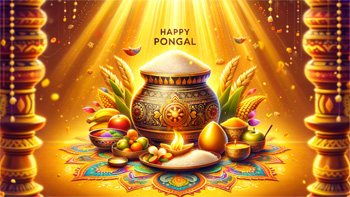Pongal is a significant festival in India, especially in the state of Tamil Nadu, where it is celebrated with great fervor and enthusiasm. It marks the end of the winter solstice, making it a harvest festival that signifies the arrival of spring. Pongal is celebrated over four days, usually from January 14th to January 17th every year. The festival is named after the traditional dish 'Pongal', which is prepared during this time. This dish, made of rice boiled in milk with raw cane sugar, symbolizes the sweet harvest and prosperity for the year ahead.
The festival is deeply rooted in agricultural practices and is a way for the people to give thanks to nature, the Sun God, and the farm animals for their contributions to a bountiful harvest. Each day of Pongal has its significance and is celebrated with various rituals and activities. The first day, Bhogi Pongal, is dedicated to Lord Indra, the god of rain, and involves the discarding of old belongings and the celebration of new possessions. The second day, Surya Pongal, is dedicated to the Sun God, where the Pongal dish is cooked outdoors in sunlight as a gesture of gratitude for providing the energy needed for agriculture.
The Cultural Essence of Pongal
Pongal is not just a festival; it's a reflection of Tamil culture and tradition. The homes and streets are adorned with beautiful kolams (rangoli) made with rice flour, which is a way of feeding the tiny creatures like ants and birds, symbolizing the sharing of the harvest with all beings. The festival brings families together, as they wear new clothes, exchange gifts, and prepare the Pongal dish. The making of the dish is a communal event, often done in the open air, where the pot of Pongal is allowed to boil over, signifying abundance and prosperity.
One of the most distinctive aspects of Pongal is the Jallikattu event, held in certain parts of Tamil Nadu. Jallikattu is a traditional bull-taming sport that is conducted as a part of Mattu Pongal, the third day of the festival, dedicated to cattle. On this day, cattle are bathed, adorned with beads, bells, and flowers, and worshipped. They are an integral part of the agricultural community, and this day serves as a tribute to their hard work and importance. The sport of Jallikattu, although controversial, is deeply embedded in Tamil culture and continues to be a significant event during Pongal.
The Social and Economic Impact of Pongal
Pongal plays a crucial role in the social fabric of Tamil Nadu. It is a time when social barriers are broken, and people from various walks of life come together to celebrate. The festival emphasizes unity, love, and respect among the community members. It is an occasion when people forget their differences, share their joys, and pray for each other's well-being. The spirit of Pongal fosters a sense of belonging and encourages communal harmony and goodwill.
From an economic perspective, Pongal is significant for the agricultural sector. It marks the end of a successful harvest season, leading to economic prosperity in rural areas. The festival stimulates the economy through increased spending on goods such as clothes, kitchen utensils, and other household items, as it is customary to buy new things during Pongal. Furthermore, events like Jallikattu and the display of cattle also contribute to the local economy by attracting tourists and promoting local crafts and traditions.
Pongal: A Testament to Tradition and Change
While Pongal is deeply traditional, it has evolved over the years to incorporate modern elements. The essence of the festival remains the same, celebrating the harvest and honoring the Sun God and livestock. However, the ways in which it is celebrated have seen changes. Urbanization and the shift from agrarian lifestyles have led to new ways of marking the festival, especially in cities. Yet, the traditional practices continue to thrive, with many urban dwellers returning to their ancestral homes in villages to celebrate Pongal in the traditional manner.
The festival of Pongal stands as a testament to the resilience and adaptability of cultural traditions. It embodies the spirit of gratitude, renewal, and hope. As the world becomes increasingly globalized, festivals like Pongal remind us of our roots and the importance of nature and agriculture in our lives. Despite the changes, the core values of Pongal - unity, gratitude, and prosperity - remain relevant, making it a timeless celebration that continues to bring people together, year after year.
In the end, Pongal is much more than just a harvest festival. It is a celebration of life, culture, and the enduring human spirit that connects us to the earth and to each other. As we move forward, embracing new technologies and lifestyles, festivals like Pongal serve as important reminders of where we come from and the fundamental values that sustain us. Through its vibrant traditions and rituals, Pongal continues to weave a rich tapestry of cultural heritage that enriches the lives of those who celebrate it, offering a bridge to the past and a vision for a harmonious future.
